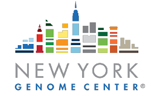Submitted by ja607 on
| Title | Complex rearrangements and oncogene amplifications revealed by long-read DNA and RNA sequencing of a breast cancer cell line. |
| Publication Type | Journal Article |
| Year of Publication | 2018 |
| Authors | Nattestad, M, Goodwin, S, Ng, K, Baslan, T, Sedlazeck, FJ, Rescheneder, P, Garvin, T, Fang, H, Gurtowski, J, Hutton, E, Tseng, E, Chin, C-S, Beck, T, Sundaravadanam, Y, Kramer, M, Antoniou, E, McPherson, JD, Hicks, J, W McCombie, R, Schatz, MC |
| Journal | Genome Res |
| Volume | 28 |
| Issue | 8 |
| Pagination | 1126-1135 |
| Date Published | 2018 08 |
| ISSN | 1549-5469 |
| Keywords | Breast Neoplasms, Female, Gene Amplification, Gene Rearrangement, Genome, Human, Genomic Structural Variation, High-Throughput Nucleotide Sequencing, Humans, MCF-7 Cells, Oncogenes, Receptor, ErbB-2, Repetitive Sequences, Nucleic Acid, Transcriptome |
| Abstract | The SK-BR-3 cell line is one of the most important models for HER2+ breast cancers, which affect one in five breast cancer patients. SK-BR-3 is known to be highly rearranged, although much of the variation is in complex and repetitive regions that may be underreported. Addressing this, we sequenced SK-BR-3 using long-read single molecule sequencing from Pacific Biosciences and develop one of the most detailed maps of structural variations (SVs) in a cancer genome available, with nearly 20,000 variants present, most of which were missed by short-read sequencing. Surrounding the important oncogene (also known as ), we discover a complex sequence of nested duplications and translocations, suggesting a punctuated progression. Full-length transcriptome sequencing further revealed several novel gene fusions within the nested genomic variants. Combining long-read genome and transcriptome sequencing enables an in-depth analysis of how SVs disrupt the genome and sheds new light on the complex mechanisms involved in cancer genome evolution. |
| DOI | 10.1101/gr.231100.117 |
| Alternate Journal | Genome Res. |
| PubMed ID | 29954844 |
| PubMed Central ID | PMC6071638 |
| Grant List | P30 CA045508 / CA / NCI NIH HHS / United States R01 HG006677 / HG / NHGRI NIH HHS / United States T32 GM065094 / GM / NIGMS NIH HHS / United States UM1 HG008898 / HG / NHGRI NIH HHS / United States |




